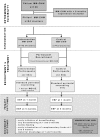The Philani MOVIE study: a cluster-randomized controlled trial of a mobile video entertainment-education intervention to promote exclusive breastfeeding in South Africa
- PMID: 30940132
- PMCID: PMC6444854
- DOI: 10.1186/s12913-019-4000-x
The Philani MOVIE study: a cluster-randomized controlled trial of a mobile video entertainment-education intervention to promote exclusive breastfeeding in South Africa
Abstract
Background: In South Africa, rates of exclusive breastfeeding remain low and breastfeeding promotion is a national health priority. Mobile health and narrative entertainment-education are recognized strategies for health promotion. In-home counseling by community health workers (CHWs) is a proven breastfeeding promotion strategy. This protocol outlines a cluster-randomized controlled trial with a nested mixed-methods evaluation of the MObile Video Intervention for Exclusive breastfeeding (MOVIE) program. The evaluation will quantify the causal effect of the MOVIE program and generate a detailed understanding of the context in which the intervention took place and the mechanisms through which it enacted change. Findings from the study will inform the anticipated scale-up of mobile video health interventions in South Africa and the wider sub-Saharan region.
Methods: We will conduct a stratified cluster-randomized controlled trial in urban communities of the Western Cape, to measure the effect of the MOVIE intervention on exclusive breastfeeding and other infant feeding practices. Eighty-four mentor-mothers (CHWs employed by the Philani Maternal Child Health and Nutrition Trust) will be randomized 1:1 into intervention and control arms, stratified by neighborhood type. Mentor-mothers in the control arm will provide standard of care (SoC) perinatal in-home counseling. Mentor-mothers in the intervention arm will provide SoC plus the MOVIE intervention. At least 1008 pregnant participants will be enrolled in the study and mother-child pairs will be followed until 5 months post-delivery. The primary outcomes of the study are exclusive breastfeeding at 1 and 5 months of age. Secondary outcomes are other infant feeding practices and maternal knowledge. In order to capture human-centered underpinnings of the intervention, we will conduct interviews with stakeholders engaged in the intervention design. To contextualize quantitative findings and understand the mechanisms through which the intervention enacted change, end-line focus groups with mentor-mothers will be conducted.
Discussion: This trial will be among the first to explore a video-based, entertainment-education intervention delivered by CHWs and created using a community-based, human-centered design approach. As such, it could inform health policy, with regards to both the routine adoption of this intervention and, more broadly, the development of other entertainment-education interventions for health promotion in under-resourced settings.
Trial registration: The study and its outcomes were registered at clinicaltrials.gov ( #NCT03688217 ) on September 27th, 2018.
Keywords: Breastfeeding; Community health worker; Community-based; Entertainment-education; Human-centered design; Maternal child health behavior; Mobile health; Narrative; South Africa; Video.
Conflict of interest statement
Ethics approval and consent to participate
Ethical approval has been granted by the Stanford University IRB (Protocol #46667) and the University of Stellenbosch IRB (Project ID #6318 HREC/UREC Reference #: N18/02/013), both recognized Ethical Review Committees. The investigators will consistently respect the principles of ethical research on human subjects, including respect for persons, beneficence and justice. Informed consent will be obtained in writing from all eligible participants before data collection begins and after the participants have been fully informed about the study.
Consent for publication
Not applicable. (This manuscript contains no identifiable data.)
Competing interests
The authors declare that they have no competing interests.
Publisher’s Note
Springer Nature remains neutral with regard to jurisdictional claims in published maps and institutional affiliations.
Figures



References
-
- World Health Organization (WHO). World health statistics 2016: monitoring health for the sustainable development goals. Geneva: WHO Report; 2016.
-
- Kuruvilla S, Bustreo F, Kuo T, Mishra CK, Taylor K, Fogstad H, Gupta GR, Gilmore K, Temmerman M, Thomas J, Rasanathan K. The Global strategy for women’s, children’s and adolescents’ health (2016–2030): a roadmap based on evidence and country experience. Bull World Health Organ. 2016;1;94(5):398. - PMC - PubMed
-
- You D, Hug L, Ejdemyr S, Idele P, Hogan D, Mathers C, et al. Global, regional, and national levels and trends in under-5 mortality between 1990 and 2015, with scenario-based projections to 2030: a systematic analysis by the UN inter-agency Group for Child Mortality Estimation. Lancet. 2015;386(10010):2275–2286. - PubMed
-
- Victora CG, Bahl R, Barros AJ, França GV, Horton S, Krasevec J, et al. Breastfeeding in the 21st century: epidemiology, mechanisms, and lifelong effect. Lancet. 2016;387(10017):475–490. - PubMed
Publication types
MeSH terms
Associated data
Grants and funding
LinkOut - more resources
Full Text Sources
Medical
Research Materials

